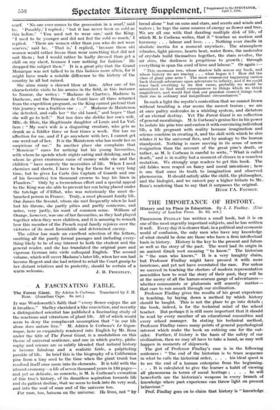A FASCINATING FABLE.
The Forest Giant. By Adrian le Corbeau. Translated by J. H. Ross. (Jonathan Cape. 6s. net.)
IT was Wordsworth's faith that " every flower enjoys the air it breathes." Shelley cherished a like conviction, and recently a distinguished scientist has published a fascinating study of the reactions' and vibrations of plant life. All of which would seem to deny the complacent assumption that " in our life alone does nature live." M. Adrien le Corbeau's Le Gigan- tesque, here so exquisitely rendered into English by Mr. Ross under the title of The Forest Giant, is a modulation on this theme of universal sentience, and one in which poetry, philo- sophy and science are so subtly blended that natural history is become fabulous and a realistic fable, a palpitating parable of life. In brief this is the biography of a Californian pine from a tiny seed to the time when the giant trunk has resolved itself once more into its elements. It is told with the utmost economy—a life of seven thousand years in 150 pages— and yet so delicate, so concrete, is M. le Corbeau's evocation of this tree's history, of its dauntless aspiration towards life and its patient decline, that we seem to look into its very soul, and into the soul of man and of the universe too.
For man, too, battens on the universe. He lives, not " by
bread alone " but on suns and stars, and scents and winds and waters ; he taps the same sources of energy as flower and tree. We are all one with that dazzling multiple disk of life, of which M. le Corbeau writes, that it " teaches us motion and harmony . . . labour and love. . . . Nothing ever dwells in alsolute inertia for a moment anywhere. The atmosphere vibrates, light pierces, hearts beat, water flows, the molecules of crystals build themselves together, the stars revolve, the air stirs, the darkness is propitious to growth ; ' through everything is spun the cord of love and labour." Or again :—
" This enormous tree, whose shadow falls across my book, and whose history we are tracing . . . what began it ? How did the class of giant pine arise ? The most evanescent happening carries back through adventure upon adventure to infinity, and if we could trace back everthing to its first cause, probably we would be astonished to find small consequences to things which we think magnificent, and would find that our grandest created things took their rise in ordinary and insignificant circumstances."
In such a light the mystic's contention that we cannot frown without troubling a star seems the merest truism ; we are at once paltry molecules in a whirling system, and dictators of an eternal destiny. Yet The Forest Giant is no 'collection of general moralizings. M. le Corbeati's genius lies in his power to isolate his pine tree and endow it with convincing individual life, a life pregnant with reality because imagination and science combine in creating it, and the skill with which he also
relates it to the universal flux, and by analogy to the human standpoint. Nothing is more moving in its sense of serene resignation than the account of the great pine's death, or rather, as M. le Corbeau is careful to write, " What is called death," and is in reality but a moment of climax in a ceaseless
mutation. We strongly urge readers to get this book. The old fables were reared on fancy and moral intentions ; here is one that owes its truth to imagination and observed phenomena. It should satisfy alike the child, the philosopher, and the biologist, and we cannot pay a higher tribute to Mr., Ross's rendering than to say that it surpasses the original.
HUGH I'A. FAUSSET.


























































 Previous page
Previous page